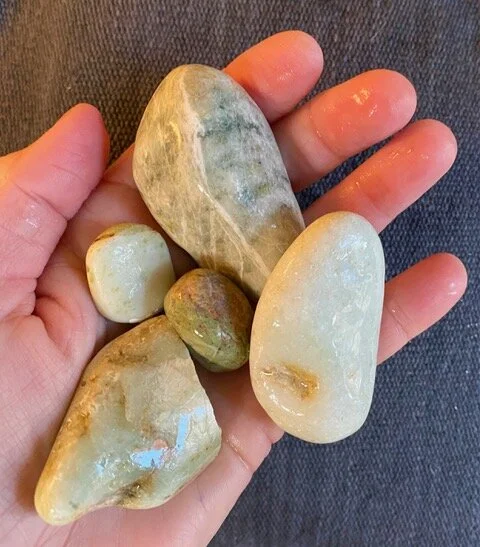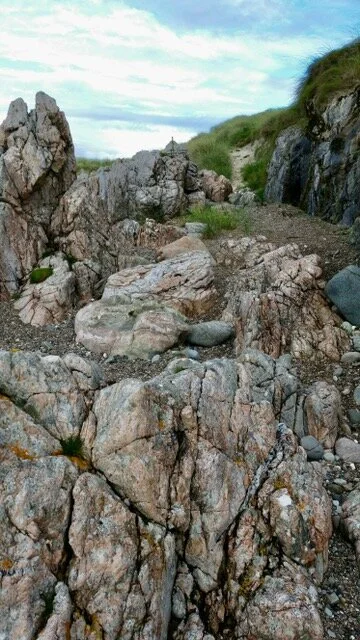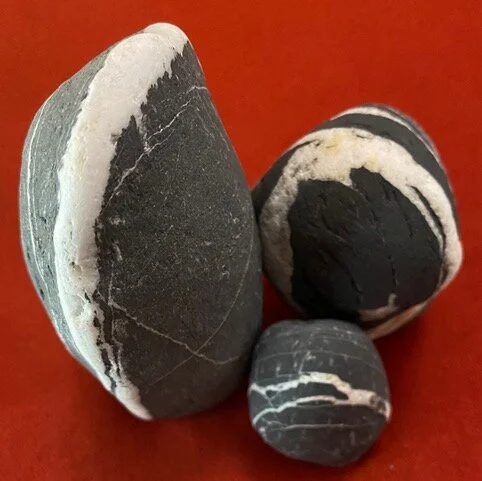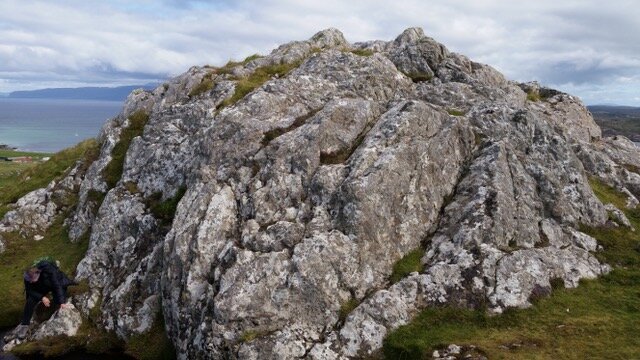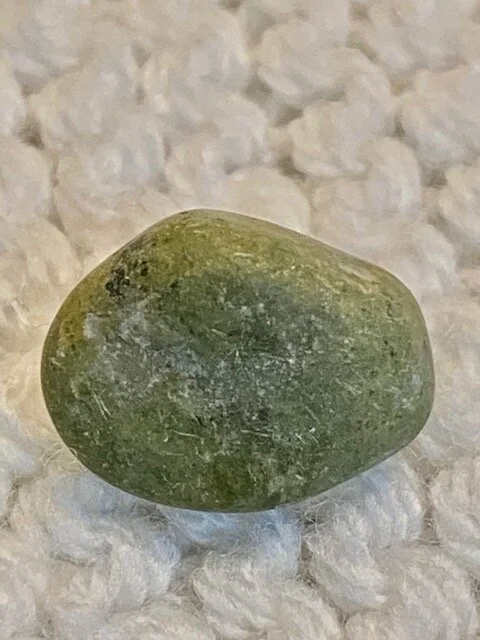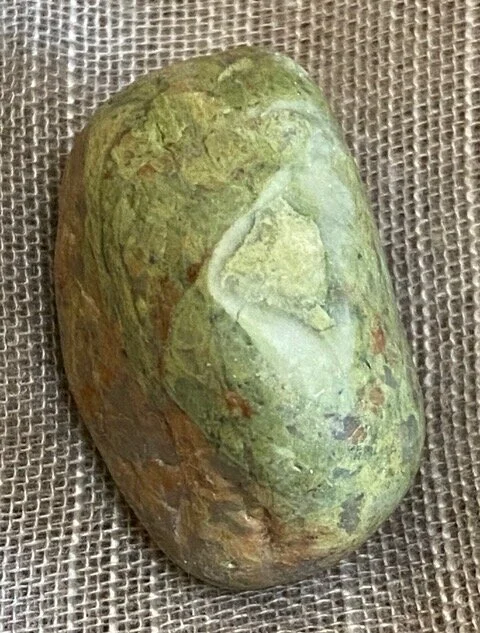Stones of Iona
Iona Crystals, Rocks, Pebbles and Stones
Iona is a jewel of a place, with an exceptional variety of crystals, rocks, pebbles, stones, and boulders that delight and inspire even the most casual of explorers. I believe that the ancient crystalline nature of the rocks of Iona contributes immeasurably to the special and unique feelings of joy, peace, rejuvenation, and wonderment that emanate across the island. It is a privilege to be able to walk on this little sacred, Holy Isle.
The more than 2000 million years old Lewisian Gneiss covers approximately three-quarters of the island of Iona. The rock is so ancient that it contains no fossils. Feldspar and quartz crystal, the most common minerals on Earth, form part of the Lewisian Gneiss on Iona. There are also large boulders of pink granite (Ross of Mull Granite), beautiful green marble, ocean-polished white quartz, and a bountiful variety of fascinating pebbles and stones.
Crystals and stones have long held mystery and intrigue in their many applications. They were used in all ancient cultures as sacred stones or talismans, stones for prophecy or divination, health and well-being, or for embellishments and expressions of power and social status. The elaborate crown jewels of kings and queens throughout human history are quite awe-inspiring in their beauty. Precious and semi-precious stones have been used in every culture for their spiritual and sacred associations.
“Indigenous First Peoples throughout the world lived in ways that showed a deep connection to the land, including to special rocks and mountains that held particular importance spiritually. Crystals and ‘spirit stones’ were used for sacred ceremonies, protection, and healing. Special stones were often buried with their owner, or passed on to family members.
The ancient Celts, too, shared a deep affinity with the Stones. From stone masonry building and elaborately carved stone Celtic knots, to the Standing Stones and Circles, the Celtic people are truly people of the Stone.”
View from a beach at the north-end of Iona showing the interface of rocks, stones, and pebbles from tidal pools to the open ocean.
For this content category on Iona crystals, rocks, pebbles and stones, I give a very brief background on the properties of quartz crystals that make them so essential to digital, sonar, and laser technologies. The same properties that make crystals essential to technology are what makes them so effective for use in subtle-body vibrational medicine. Next, I provide a few examples of ancient Celtic connections to special rocks on Iona. Lastly, I offer descriptions and photos of some of the variety and beauty of stones of Iona.
(If you are interested in more detailed information about quartz crystals and their applications, please see the three one-hour videos in the website section titled: Crystals, Chakras, and Sacred Geometry.)
Crystals have a very unique and special property which is referred to scientifically as piezo-electric. The piezo-electric nature of Crystals means that when external pressure is applied to the crystal, the crystal emits an electrical charge. Crystals also have the characteristic of inverse piezo-electricity. This means that when an electric charge is applied to a crystal, the crystal emits a steady electric pulse.
The vibratory pulse of a crystal’s electric charge is so steady and consistent, that this quality makes crystals valuable in watches and timekeeping, satellites, medical devices, security apparatus, and many, many other sectors of our technological world. Silicon chips in computer technology are an example of the use of crystals for communication. Certain quartz crystals naturally receive, store, and emit information, making them essential components for computer and laser communication technologies. Crystals are also used in abundance for their naturally-occurring semi-conductive and amplification properties.
Another natural characteristic of quartz crystal is its capacity to amplify a charge. Some examples of the amplification effect of crystals can be found in sonar technologies, radios, transistors, microphones, amplifiers, and most digital electronic devices.
“That said, one could then easily imagine that all the prayers, voices and acts of love, appreciation, and gratitude that have been felt and expressed on Iona for thousands of years have been embedded in the rocks themselves. Crystals (like water) receive, store, and emit vibrational frequencies that reflect and impact their environment.”
The Isle of Iona’s intimate relationship with water (the sea and holy wells), together with the cumulative effect of a dynamic positive energy field that has been nurtured for thousands of years on Iona by spiritual and religious seekers and adherents who have set foot or lived on her shores, contribute immeasurably to that distinctly Iona feeling of deep peace, rejuvenation, and ‘coming home’.
The Holy Isle of Iona is a natural crystal beacon of Light with its ancient rock, clear turquoise waters, white sandy beaches, and ethereal rainbow colours of light. There are many dimensions of light that can be experienced on Iona unlike anywhere else. The unusual light has attracted artists to the Island for generations.
There are intriguing books and videos that examine the sacred nature of the rock universe of our Earth, and the role that ancient rocks have played over eons of time in human culture, civilization, and religion. One example of a holy rock site that is revered by three major religions, Christianity, Judaism, and Islam, is the Dome of the Rock on Temple Mount in the Old City of Jerusalem. The ‘Foundation Stone’, the ‘Noble Rock’, is at the centre of the Dome of the Rock. The rock cave under the stone is called the ‘Holy of Holies’.
There is much more yet to be explored and discovered about the significant roles that rocks and minerals have played, and continue to play, in the unfolding and evolving story of human spiritual development.
Rock face on Iona. Do you see Pan’s face?
“I have had the experience many times (and I am sure that I am not alone in having that experience) of looking in wonder at a particular outcrop of rock on Iona that takes my eye, and at that moment it is as if the veils of time and space are lifted and the mists of alternative dimensions softly wisp across the scene and the ethereal beauty and magic of it all simply catches my breath and breaks open my heart in sheer wonderment and awe. It is in experiencing such mystical moments that one feels utterly transported out of the familiarly known dimensions of Earth. Such is Iona and the mystery and intrigue of her rock foundation.”
There are some interesting dynamics that exist amongst rocks, crystals and water. One thing is that water and quartz crystal have very similar atomic structures. Ice crystals and quartz crystals are both hexagonal, six-sided shapes. Clear quartz crystals can be so clear and pure that it is as if they are hardened water in silicon form.
Quartz crystals grow as a result of the ongoing dynamic forces of heat, pressure, and movement within the Earth. They grow as a result of the evaporation of water in the steamy currents and pathways inside the womb of Earth. Crystals grow as seeds from the specific mineral content that is left behind once the extremely hot water evaporates in the ongoing processes of pressure, heat, evaporation, and condensation.
“From the tops of mountains, and from the rocky hillsides, Water naturally emerges out of open cracks from rock faces, or in the form of wells or springs. Rocks often cradle and hold the clear pure Water that emerges from the Earth herself. There is a special relationship between water and rocks.”
The Stone of Destiny and Druid Rocking Stones
There is a lesser-known history of Iona that is associated with certain special rocks. Celtic Druids inhabited the land for thousands of years before the arrival of Columba from Ireland in 563 CE. Iona was home to a renowned and highly-respected school or college of learning for ancient Celtic Druids and Druidesses.
The Druids and Druidesses were a scholarly and judicial class of aspirants, teachers, philosophers, poets, and co-creative wizards with Nature. They were the knowledge keepers and teachers within the culture of the vast Celtic civilization. Their knowledge, wisdom, and principled views of judicial and Earth stewardship were highly respected. Druids and Druidesses held positions of leadership and provided priestly advice amongst the Celts, and especially on behalf of the Kings and Queens of the many tribes.
One famous stone that has links to Iona is the ‘Stone of Destiny’, or ‘Stone of Scone’. The ‘Stone of Destiny’ is also called ‘Lia Fáil’, in Gaelic, the ‘Speaking Stone’, and the ‘Stone of Tara’. It is an especially sacred relic. Its ancient origins are still a mystery, but there is no doubt that it has had a very extraordinary purpose and destiny. The Stone was used for thousands of years as an important part of inauguration and coronation events that bestow kingship and queenship, first in Ireland, then Scotland, then England. St. Columba ordained Aiden as King of Dalriada on Iona in 574 CE using the ‘Stone of Destiny’.
There are numerous legends and stories about the ‘Stone of Destiny’. One story has the Stone as the original stone pillow of the biblical Jacob when he dreamed of a ladder of angels leading to heaven; the stone was subsequently consecrated to God and became a sacred stone. Others say that the stone travelled out of Egypt with Scota who was the royal daughter of a pharaoh. Scota and her family sailed west, settling first in Spain and then travelling to Ireland, and to the west coast of Scotland.
The ‘Stone of Destiny’ was a powerful sacred relic housed within the Gaelic kingdom of Dalriada, first at Tara in Ireland. Dalriada included, at that time, Antrium, Northern Ireland, part of the Inner Hebrides, and Argyll. The population was predominantly Irish. The Irish were referred to as the Scoti. The Scoti of the Dalriada eventually were united with the Picts under King Kenneth MacAlpin in 850 CE.
Some believe that the ‘Stone of Destiny’ was cared for by the Culdees and the priests of Columba on Iona, and that it was moved by King Kenneth MacAlpine in 850 CE. It was after Iona had experienced many Viking raids that the ‘Stone of Destiny’ together with other sacred objects from Saint Columba’s monastery needed to be moved to safer locations. MacAlpine brought the Stone to the town of Scone. Scone was an early religious centre of the Culdees. The Stone was safe there until 1296 CE when it was taken by Edward the First to England.
The Stone was finally returned to Scotland in 1996 to Edinburgh Castle where the public can view it. A caveat to this story is that the Stone that is in Edinburgh Castle is a 152 kg rectangular-shaped stone of Old Red Sandstone, believed to have been quarried in the vicinity of Scone. However, there are some who belief that it is not the original Stone, and that the original ‘Stone of Destiny’ is hidden somewhere on the Isle of Skye. The original Stone has been described as a black or semi-metallic stone with a concave shape like a round chair. Walter Guisborough was a chronicler of the ordination crowning of Alexander the 3rd in 1249 CE and he described the Stone of Destiny as being black in colour.
Another interesting and unique stone on Iona is called a ‘Rocking Stone’ or ‘Logan Stone’. Apparently, there is a ‘Rocking Stone’ located on the north-east side of Iona.
‘Rocking Stones’ are also associated with Druids. The scholarly Druids were the justices of their time. It is believed that the Druids used a ‘Rocking Stone’ as a tool to assist them in determining the innocence or guilt of someone who was being charged with an offence. A ‘Rocking Stone’ is apparently so finely balanced that only a very small amount of force such as a delicate touch by a finger can cause them to rock. Yet, they are otherwise immoveable by human forceful pushing. It is fascinating to consider how the Druids might have used the tool.
The Plaque Stones, House of Prayer, Hill of the Dove (‘Cnoc a’ Chalmain’)
One of the most unusual and historic collection of sacred stones can be found at Iona’s House of Prayer.
The beautiful plaque of stones shown in the photo can be found hiding in plain sight. To go to into the House of Prayer, one walks up stairs to the entrance. At the top of the stairs, if you turn right at the landing you enter through a doorway and small vestibule into the House of Prayer. If, at the landing, you look instead to your left, you will see ‘The Plaque Stones’ on the railing. A description reads:
Plaque Stones, House of Prayer, Iona
“THE PLAQUE STONES
From the Seven Churches of the Book of Revelation: Ephesus; Smyrna; Pergamum; Thyatira;
Sardis; Philadelphia; Laodicea
and from other early Christian places:
Corinth; Philippi; Cenchreae; Hierapolis; Troas; Colossae
May they reflect firm foundations on which you will build.
I.T.
”
Iona’s large Celtic High Crosses are examples of exquisitely detailed stonework.
There was a long-standing tradition of stone masonry and master mason apprenticeships on Iona. By the middle of the 9th Century, there were many different styles of large stone crosses on Iona. The stone crosses are primarily carved out of a dark green crystalline rock that is not of local origin (www.nature.scot). Crosses of similar rock (metamorphosed basalts) are found throughout western Scotland and Ireland.
This sacred Celtic land of crystals, stones, rocks, minerals, sea and sky, holds the memory of the earliest beginnings on Earth.The memories are there in the rocks themselves – memories of the formation of the firmament of Earth.
Next, in the last part of this section on ‘Iona Crystals, Rocks, Pebbles, and Stones, I share a few samples of Iona’s unique variety and treasure of stones, crystals, rocks, and boulders. Enjoy!
St. Columba’s Bay
These photos were taken at Columba’s Bay at the south end of Iona. Columba’s Bay has a most delightful and abundant Lewisian Gneiss stone beach that is an exhilarating joy to explore.The unique and colourful pebbles in this photo are from the beach at Saint Columba’s Bay at the south-end of Iona. It is easy to spend many hours searching through the beach stones to find a favourite or two. Just hanging out with them by the ocean is bliss. There is also a stone labyrinth to walk at this south-end location.
Bay at the Back of the Ocean by the Machair
The beach by the ‘Bay at the Back of the Ocean’ on the west side of Iona, by the Machair, is characterized by beautiful views of the vast Atlantic Ocean, the natural exhilaration of open spaces, and the extraordinary variety of stones to explore. There are so many stones to hang out with here.
South-end Iona Quartz Crystals on Lewisian Gneiss
These two photos were taken at the southeast end of Iona. They show large milky white quartz in Lewisian Gneiss.
The ‘Mother Rock’ on Dùn-Ì, by the Well of Eternal Youth
The ‘Mother Rock’ at the top of Dùn-Ì, on the east side, beside the Well of Eternal Youth (to the left in the photo). The Mother Rock is predominantly quartz crystal and quartzite.
Sandy at the top of the Mother Rock on Dùn-Ì, beside the Well of Eternal Youth. You can see that the whole rock glows with outcrops of quartz crystal.
This photo is a close-up view of the crystal outcrops on the top of the ‘Mother Rock’ by the Well of Eternal Youth, on Dùn-Ì. It is an exceptionally magical and powerful place to explore.
Wizard Stones from Saint Columba’s Bay
I call this collection of special Iona stones 'Wizard Stones' because of their unique look and feel as well as their unusual energetic emanations. There is a surprising uniformity to them as well. And each one of them feels really great in the palm of my hand.
These stones feel especially magical and ready to be used in a wizardly co-creative way with Nature. They are joyful and playful stones. They each have a clear stone spirit. They feel like Druid stones, or stones that Druids might have used for ceremonies or to facilitate direct communication with nature spirits.
I always ask a stone if it is willing, and in agreement, to leave its home. So many stones have travelled the world from Iona. It is truly a gift of Spirit that Iona has given to people who visit from all over the world.
To have a stone from Iona is to be truly blessed.
White Crystal Polished Iona Stone
This white quartz stone has been polished by the Atlantic Ocean. It has an especially high radiance due to its dynamic experience with the ocean. It is pure essence of the life force of water and of creation.
“Iona Crystals carry the electro-magnetically imprinted memories of all that has transpired on Iona,
as well as the memories of the beginning of Earth’s formation.
Iona quartz crystals radiate a high-pitched glorious sound of Life experiencing Life. ”
Iona Crystals are the communication vehicles that, together with the wind and the water, the sun, moon, and stars serve to amplify the rejuvenating and healing effects of Iona.
Stepping foot onto Iona is like stepping into a vast crystal cave where the naturally balancing and uplifting effects of crystals do their work of healing body, mind, and spirit.
Iona Marble - Peace of Iona
One of the most beautiful stones on Iona is the Iona White Marble with green nephrite. This stone has a very soft and gloriously peaceful vibration.
There once was a functioning marble quarry on the island where the beautiful marble was mined. It is a joy to find any piece of Iona Marble and the gift shops have some very beautiful jewellery creations showcasing the marble.
To me, Iona Marble is the Stone of Peace. This exquisite marble also carries the vibration of Mary, and the Divine Feminine. The vibration of Peace flows out from Iona to the world. It flows upward and outward like a great fountain of soft, pure impeccable Light. Peace unto the world. Peace. Peace.
Serpentine Stones
These beautiful green nephrite/serpentine stones are special treasures. Their green colour evokes the deep green healing energy of the heart of Nature. They are greatly valued for their rare beauty and deep green colour.
“Green is the colour associated with the Heart Chakra, as is the colour pink. Both colours blend together beautifully, deepening our connection to All That Is and the unlimited healing energy of Nature. ”
Hexagonal Basalt - Staffa Island
Staffa is a spectacular island just north of Iona, about one hour away by boat. There are some fantastic photos on-line that will surely inspire you to visit Staffa if ever you have the good fortune to do that.
It is a magical and mystical island. Staffa is unique for her naturally standing huge black basalt pillars. The pillars are formed in a hexagonal shape, and their blackness speaks to their volcanic origin.
“There are three large caves on Staffa, the largest of which is called Fingal’s Cave. The open mouth of this cave sings out directly to the crystalline structure of Iona, and at the time of the Full Moon, there is a triple spiralling energetic boost of celestial Divine Feminine energy that occurs with the interplay of Fingal’s Cave,
The Moon, and the Well of Eternal Youth.
”
The musical connection amongst Staffa, Iona, and Mary of the Sea is also a factor in the octaves of harmonics of celestial music that sings forth from Iona.
The beautifully soft yet strong and bold emanations of black hexagonal basalt hold the grounding space for multi-dimensional Earth, Sea, and Sky activities.
‘The grand hexagonal basal pillars of Staffa stand as enormous tuning forks calibrating deep earth energies, holding the form of perfect six-sided-ness.’
The blackness of Staffa’s basalt and the whiteness of Iona’s crystals form a perfectly balanced yin and yang effect. This balance creates conditions conducive to especially strong celestial and terrestrial symphonies of Light and Sound throughout the whole area.
Iona viewed from Staffa shines as an inter-dimensional portal to ‘the above, and the below’. She IS the bright jewel of the north.
The smaller pieces of black basalt stones are precious. Small pieces can be found on Iona as well as on her neighbouring Isle of Women.
These smaller pieces of basalt have broken off from the larger causeway corridor hexagonal-shaped basalt of which Staffa is connected. The black basalt stones are brought in by tides and storms. The energetic imprint of black basalt reminds us of Black Madonna, Mary energy. Pure. Strong. A Sacred Earth connection.
In summary, Iona offers a special experience with the minerals and rocks of our sacred Earth. Ancient they are, and beautiful. They hold the mysteries and stories of Holy Iona.


